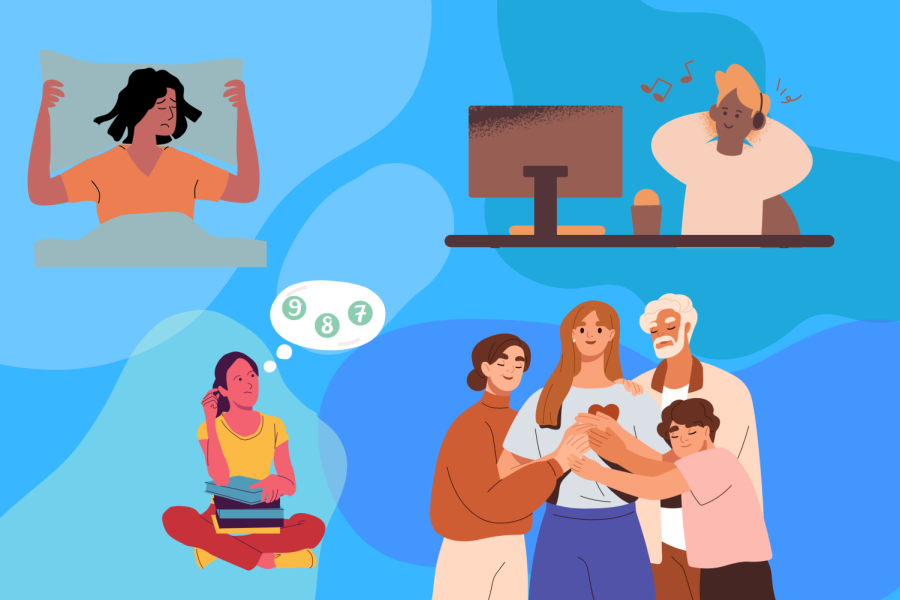The End of the Semester is Not the End of You
Michael Duggan, a counselor at COD, weighs in on students’ stress during finals time and how to cope with it.
May 15, 2023
Almost every college student can relate to cramming for an exam late at night. However, imagine cramming all night long only to fall asleep – and stay snoozing through all your final exams.
According to Michael Duggan, a full-time counselor at COD, that is exactly what happened to a nursing student at COD many years ago. It was the worst scenario he had ever witnessed a student experience as a consequence of finals stress.
Duggan has been a counselor at COD for more than 19 years and worked in counseling at a community college in Oregon for five years prior.
“[The student] came to my office in the afternoon in an utter panic, because their tests had been over and wasn’t sure what to do about it and was worried their careers and lives were over,” Duggan recalled. “Thankfully, the teachers were reasonable and allowed them to come in later that day to take their exams.”
Despite the fact that everything worked out for this particular student, Duggan still recommends setting multiple alarms to avoid oversleeping and missing any exams, especially those early in the morning.
Duggan said finals have always been a challenging experience due to high expectations and portioned as a large part of students’ final grades. However, the situation has become even more stressful since the pandemic.
“It’s been especially hard the last couple years since we’ve come back from the pandemic, because I think there are additional stress factors that press upon students, as they’re learning, developing those skills that maybe they didn’t use or weren’t using the same way they did during the pandemic,” Duggan said. “And so I think that amplifies anxiety for students.”
Although all students are vulnerable to stress due to finals, individuals with preexisting mental health issues are even more at risk of mental health declines at this time of year.
“It can be amplified, because now they have the stresses of their day-to-day lives plus the stresses of these final exams,” Duggan said.
Students with preexisting mental health issues must be especially reliant on their coping skills, while the rest of the student body can benefit from them as well.

“The key is developing good coping mechanisms and trying to find ways to better manage your anxiety and cope with those fears, pulling in your support system as much as you can for encouragement and affirmation that you’re going to succeed, because students do,” Duggan said. “And I think with good planning, it’s something that can be overcome.”
Some basic coping mechanisms Duggan suggested include counting backwards from 100 to one or 10 to one, listening to relaxing music and positive affirmations. However, each student is unique, so the coping skills that work for each individual may differ from person to person.
Additionally, Duggan emphasized that whenever you see another person struggling, it is vital that you try to be there for them, even if it’s in a small way and regardless of whether you know the person.
“We all as human beings have to remind ourselves that life is tough, and we’re in this together,” Duggan stressed. “So whenever I see a person showing signs of stress or anxiety or having a tough time, regardless of the reason, I try and reach out and check in and make sure they’re okay, even if I don’t know the person.”
These interactions can be more important than they might seem.
“Often, the person may just say, ‘I’m fine,’ you know, ‘I’m okay,’” Duggan said. “[But] we never know if that split second of kindness might be exactly what a person needs to hear.”
Of course, before we can be there for other people, we must take care of ourselves, whether it’s during finals or year-round.
“Get rest, (and) try to block off time to do things that make us happy and relaxed, even if we’re juggling work and life and families,” Duggan suggested. “Trying to find the small windows with time we’re going to do good things for ourselves helps.”
Another important step towards self-care is recognizing your support system.
“Remember that college is something that barely is accomplished by the person alone; it takes a village,” Duggan explained. “It takes other people to support and encourage the person, and that can be family members or friends or significant others, or it can be people like myself who work here at COD. It’s important to take inventory of all those people who are rooting for you.”
Overall, Duggan wants to remind students they are not alone in facing finals or any other challenges they might encounter throughout their academic careers.
“We as counselors are here for you. We care,” Duggan said. “We want to be there for you however we can, and you should never feel like you’re alone as you’re going through school here. There’s always going to be at least one person who’s going to be in your corner rooting for you.”
If stress ever gets too overwhelming, crisis counselors are available in COD’s counseling center in SSC Room 3200 if you need to see someone immediately. The contact information for Counseling, Advising and Transfer Services can be found on the COD website. Students can also access a live portal to directly message counselors and advisers.

















